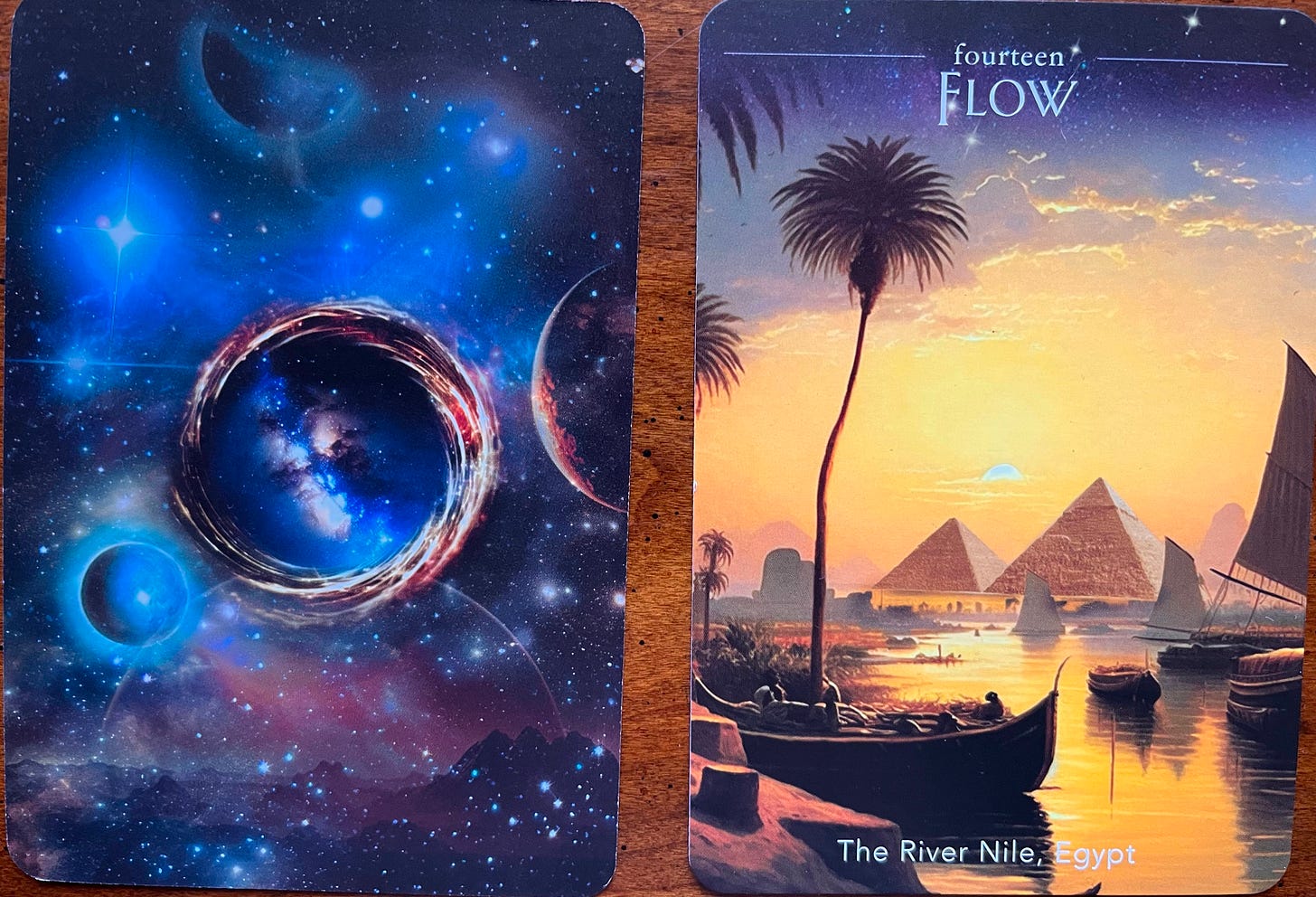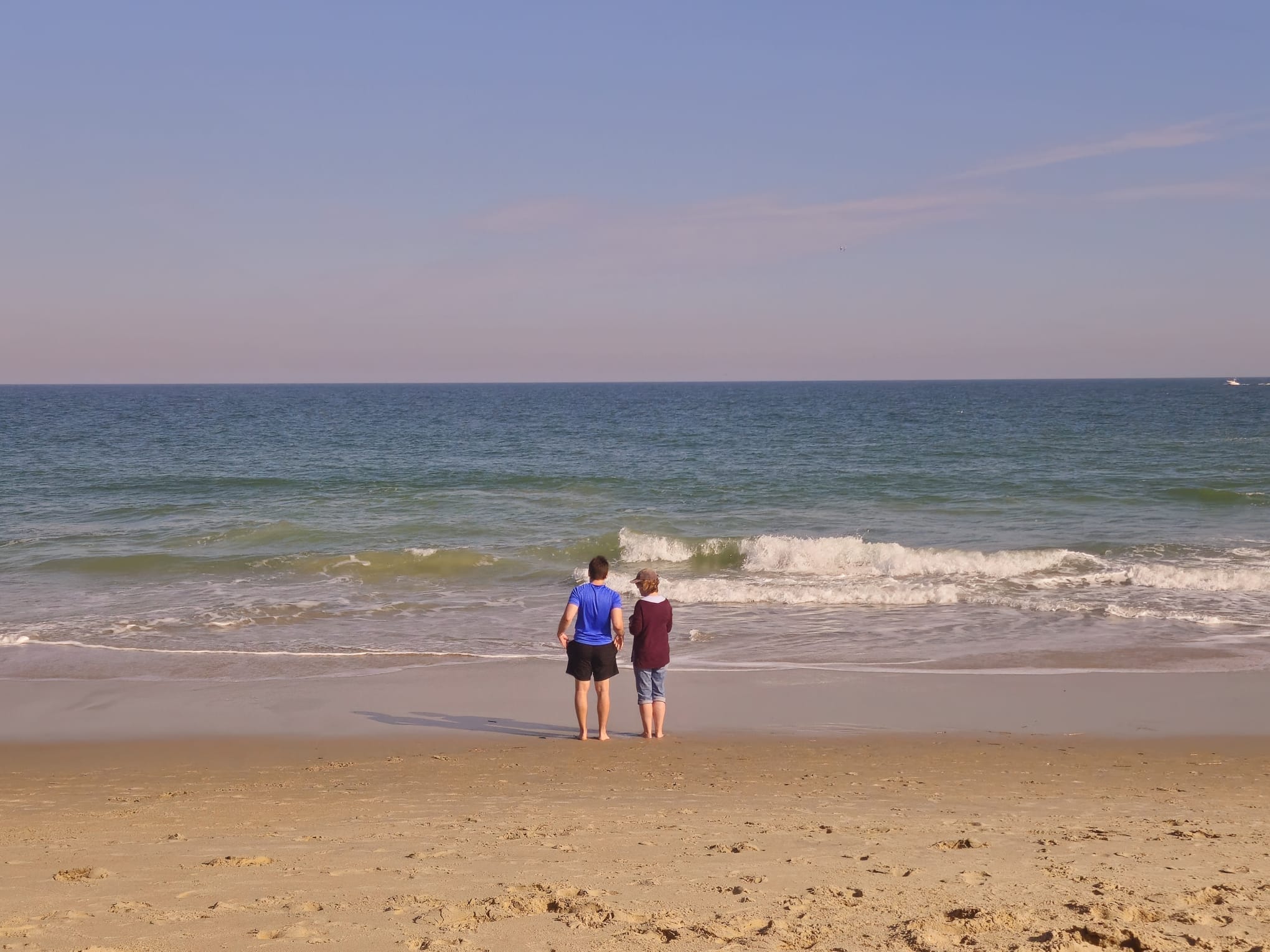I recently purchased a Time Travelers Oracle deck. Oracle decks are a little like tarot cards, without the longstanding rules of symbolic interpretation associated with each archetype (e.g., the hanged man, the fool, the ace of wands, and so on).
Oracle decks come in many different themes and designs. So, for example, I also have a Writers Oracle deck—which includes prompts, role-playing scenarios and exercises for scene setting, character and plot. A nice way to replenish your creative juices.
Both tarot and oracle cards offer a way to look at things from a different perspective. They may also offer intuitive guidance.
People consult such decks for many reasons: the aforementioned creativity spur; for interpreting unclear situations in their lives; seeing where they may feel trapped; deciding on a course of action; or seeing into the future. They may also be read as political augurs.
Since I don’t have the patience to learn the rules of tarot, I find oracle cards to be far more accessible. I consult them for fun and to give myself artistic license. The time travel theme allows me, as author of a time-travel adventure books series, a fun way to picture my characters in different spacetimes—and to get them through obstacles. When my characters dive deep into the past, they have been known at times to get stuck at inopportune moments at risk, say, of burning at the stake. Or hanging by guillotine. Or lynching.
Or having a really bad hair day.
It is generally my job to figure out how they might extract themselves from danger or to keep them from getting into more hot water—say, erasing their existence in the present. It’s also my job to get them home before anyone notices they’re gone.
This last rule hasn’t been working too well lately at the Edge of Yesterday. My GenZ, STEMinista protagonist Charley has been taking me along on her leaps into history and, as of late, spinning forward a gap year—or three.
So it takes a bit of soothsaying, and these decks can offer the perfect tool to see how things might turn out—in fiction and in fact—and to reverse engineer them to fit within my story framework.
While many people consider consulting “oracles” to be “woo-woo,” or “magic” (or, betimes, “black magic”), I tend to feel a random card selection gives me access to intelligence or answers not available when I’m focused too hard on problem-solving using my rational mind.
It’s that fabled left-brain-right-brain myth that happens to work—even if it’s not true.
While it is my habit as a science writer to seek evidence and proof, even in fiction, I have learned that, when it comes to understanding the mysteries of life, science is often a laggard—what gets studied depends on who’s funding what. And that funding, as we have learned, is often a financial or political decision. A matter of priorities at any given moment.
More often than not, though, we creators need a way to “know” things before there is a will to fund the science to support that knowing.
Even so, I always try to use discernment when reading the oracles. Discernment, according to Webster’s, means “the quality of being able to comprehend what is obscure.”
Being able to comprehend what is obscure. Or, I might say, to comprehend what has been obscured. Hidden in plain sight. Checking in with my gut, my awareness and my inner senses to see more clearly into what is true.
Which, like everything, even science, may evolve over time.
So that Time Travelers Oracle deck. There’s something magical in their design.
The card I pulled had this message: FLOW. It was card number 14 in the deck. Lo, and behold, we’ve time traveled back to ancient Egypt where a placid-looking, gold-flecked River Nile. It is teeming with barges and sailboats, its banks lined with palms.
Since this deck is new to me, I need to get my bearings before I read anything into its message. In my experience, the more time I spend “reading” the energies of the oracle, the better I get at “divining1” its meaning—for myself, if not for anyone else.
Reading the card is tricky, relying, as it does, on a combination of understanding the signs and symbols of Ancient Egypt, the meaning of the numbers, and mapping it to my own experience. As much as anything, it depends on my own emotions—or energy in motion, as I define that word, emotion.
Number 14
The Nile River
A rising (or setting) sun peeking through clouds
Pyramids and, shadowed in the distance, the Sphinx
Message: FLOW
Before jumping to answers, I do my research. It turns out that the number 14 in numerology represents going with the flow, releasing old ideas, beliefs and ways of thinking to embrace new ones. In ancient Egyptian numerology, the number 14 is primarily associated with the myth of Osiris, where he was said to be cut into 14 pieces, signifying the fragmentation and subsequent reassembly of the god, representing rebirth and renewal through the process of death and resurrection.
In this system, the number 14 can be interpreted as a symbol of cyclical renewal and the power of overcoming fragmentation.
As for that emotion—the energy-in-motion? I recognize that, in the ancient world, nothing would better symbolize this power of death and destruction and rebirth than the flow of the River Nile. The ancients marked the seasons by the predictability of flooding and renewal of the earth.
Ebb and flow. Destruction and renewal. Peace and upheaval.
And, in the present, how do I read it?
My intuition says that, for this Egypt card, the numbers and the image reinforce the message: there is a cyclical nature to the flow of history, of events, of time and space. The flow of Nature in us.
Numerology is not “science” in the sense we understand that word today. Certainly doesn’t incorporate the scientific method.
But in the archaic sense of its meaning—knowledge of any kind—science might offer other ways to understand, to intuit, things that modern science has not yet studied, or cannot explain. Or accepting how different and seemingly competing “facts” can be true at the same time.
Consider: in the modern world, numbers are seen as “hard.” Indisputable. At the same time, we assign mystical and magical meanings to numbers in our world—playing the lottery, for example. Or winning at cards. Bingo!
But we cannot measure everything—at least not yet. Human nature isn’t a by-the-numbers phenomenon to be measured. Energy cannot be pinned down, as quantum physics has demonstrated. It may flow—as in a wave—or be measured as a point in time. But not both.
What about us? Do we flow? Or stop at a point in time?
The fact is, we, too are part of Nature. When divorce ourselves from understanding that everything is cyclical, with its own ebb and flow, we may stay stuck at a point in time that is passing.
If we are to regain the wisdom of the ancients, we must recognize the underlying forces that remind us how we are part of Nature.
That we flow as Nature does—not apart from her.
“On ne découvre pas de terre nouvelle sans consentir à perdre de vue, d'abord et longtemps, tout rivage.”
“We do not discover new worlds without first agreeing to lose sight of the shore.”
~André Gide
Egypt. The River. Flow. 14. What could that mean?
I read my card pull as an exhortation for me to go with the flow.
It’s not as easy as it sounds. We are living in a time of great upheaval. Holding on to beliefs from the past, things that may once have kept us safe, things that feel familiar— that is powerfully tempting.
And yet, it seems that—cards, numbers and pictures aside—we are being drawn into something new—losing sight of the old shoreline, and not yet in sight of a new one.
This unfamiliar space, one without landmarks to guide us, is scary. Some of us encounter it kicking and screaming. Others have closed their eyes to the tumult—the assault feels overwhelming.
We can ignore or resist—or flow. Believing you can sleep through an earthquake doesn’t strike me as smart. Resistance adds friction. Going with the flow isn’t always the smoothest ride.
Nothing about any of these approaches to weathering the storm all around us feels—normal.
I mentioned this message about going with the flow recently to a friend. He asked me the hardest question: if it turned out that they were not ready to let go, could I leave behind my family?
Umm. . .I wasn’t expecting that. I was thinking of the idea of what is ebbing away: trusting the rule of law. A country of, by, and for the people. Cherished cultural norms. Cheap eggs.
Difficult not to try to hold on to the things that, for the past 250 years, we have understood are foundational to our identity in these United States of America. And that many feel are being pulled out from under us.
Family, though!
The question gave me pause. But no. I cannot lose sight of the people I love. Even—especially—if they are not ready to let go of the past—and can’t even that we’re slipping away from the shore of familiarity.
Not that I will save them. (Who am I to say that they need saving?) Or that I will let them keep pulling me back. (I have done this in the past, to my own detriment.)
How does this even work? I have no idea. Perhaps it means I will always be stretching a hand to the shoreline and eyes focused out at sea.
As with the ebb-and-pull of tides—whether along the Nile banks or the shoreline of the far-closer to home North Atlantic—there are stages to release. Toe in the water, wade in waist-high, let go.
The farther out one ventures, the harder it is to keep connected to the life—and ways—we have always known. Wading in waist-high, waves will wash over us, the tides carrying us into new depths. The shoreline ever fainter.
As the French poet, André Gide, wrote, ““We do not discover new worlds without first agreeing to lose sight of the shore.”
Sometimes, in release, there is freedom. Sometimes, storms. Nothing is guaranteed.
I am letting go slowly. In small measures. Arms outstretched and eyes open. Tightening my life vest. Watching for treasures, and a distant horizon.
One shoreline disappears and eventually, another shore arises, beckoning us into a new world.
One, we can dream full of light.
According to Etymology Online, the word “to divine” derives from the late-14c. verb, divinen, "learn or make out by or as if by divination, foretell" future events (trans.);" from Old French deviner, from Vulgar Latin *devinare, a dissimilation of Latin divinare "foresee, foretell, predict," from divinus "of a god," from divus "of or belonging to a god.





Much to enjoy here, Robin! I love working with cards, and I wish you well with your emerging novel. Here's one of various passages that stand out for me:
"While it is my habit as a science writer to seek evidence and proof, even in fiction, I have learned that, when it comes to understanding the mysteries of life, science is often a laggard—what gets studied depends on who’s funding what. And that funding, as we have learned, is often a financial or political decision. A matter of priorities at any given moment."
In your essay, I appreciate the distinction you draw between modern and ancient science, and how you point to a greater integration of ways of reading the world. In essence, that's what my next novel is about.
A couple of my favourite oracle decks (and I have quite a few) are the Mystical Shaman Oracle and The Enchanted Tarot. The Time Traveler's Oracle looks fun! Denise Linn is a wonderful teacher.